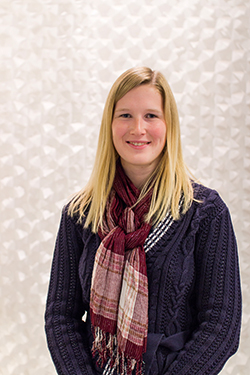Jana likes that KTH gives her an opportunity to specialise if she wishes
Jana has the Luxembourgish and German dual nationality, and she studied the master's programme in Sustainable Technology at KTH between 2015 and 2017. She previously completed her Bachelor's degrees (mathematics; political science/economics) at the University of Heidelberg in Germany.

What made you choose KTH and your master's programme?
During my bachelor's studies, I completed a few internships that touched upon the topic of sustainability. The issues discussed there fascinated me, and I decided this was what I wished to do for the rest of my life. As I was nearing the end of my bachelor's studies, I started searching for universities that offer master's programmes related to sustainability issues and use either German, French, or English as their language of instruction.
I first narrowed down the list of possible universities by looking at the curriculum and the specific lectures I was going to attend. From that list, I read experience reports from older students, and I travelled to the cities they were located in.
KTH's Sustainable Technology master's programme had the great advantage that it was ranked first according to all three criteria: the lectures seemed varied and exciting, the city of Stockholm made me feel at home from the moment I arrived, and the reports from previous students were positive throughout. As a bonus, all worries about not being able to get around without speaking Swedish were quickly dispelled, as I have still to meet a single resident of Stockholm that is not fluent in English.
What do you see as the greatest aspects of your master's programme?
When I looked at other universities, I realised that many of them looked at the concept of sustainability in a very large setting. They discussed the concept of sustainability, how it benefits society, and what the overall goals are - without ever considering which societal measures could achieve the identified goals, or how to implement these measures.
Some other universities focused towards the other extreme, only picking a single aspect of sustainability (such as energy), and then forcing students to further specialise within that one aspect - looking at either wind turbine design, energy efficiency measures, or a similarly specific subdomain. KTH, however, starts with broad concepts and then enables you to pick your specialisation if you so wish.
Also, other universities were either highly theoretical or focused solely on implementation questions. However, I believe that learning about a concept in your master's programme will not benefit you in your job unless you also know how to apply it - just as you can never properly carry out an analysis unless you understand the theory that your methods are based on. KTH's Sustainable Technology programme unites both, dedicating the first year to learning the theoretical framework, and making you implement the theory during the second year of your studies.
So, two things make the programme here stand out from similar programmes at other universities. First, KTH gives you an opportunity to specialise if you wish but does not force you to. Second, the programme is neither too theoretical, nor does it completely disregard theory.
What do you like most about KTH?
First of all, the staff members here are incredibly friendly and willing to help with any questions. The mere fact of seeing my concerns being taken seriously made me feel more at ease here after a few months than I was at my previous university after six years.
Second, the teaching quality here is amazing. For instance, the largest lectures here never have more than 100 students attending, and typically lectures will be held in front of 15-40 people. In contrast, even advanced seminars in my previous programme rarely had fewer than 40 participants, and lectures were usually given to 300-800 people at a time.
Finally, I also like that the university has launched several investigations to learn about its own sustainability (regarding energy efficiency, transportation, and so forth). It gives me the feeling that sustainability is not only a course the university teaches, but a concept it wishes to see implemented - which, in turn, gives the program a much more "honest" feeling.
What are your impressions of Stockholm and Sweden?
Considering it is the largest city in Sweden, Stockholm is very cosy as a town. The parks, the little cafés, and the overall, general friendliness of Swedish people contribute to the fact one can feel at home here really quickly.
Also, everyone speaks English, and there are many activities one can pursue outside one's studies. From gyms and sports clubs to more relaxed settings like taking a kayak trip, ice skating on a plaza, playing a round of mini-golf, or playing beach volleyball in a park, everyone's sporting needs can be met. Besides that, the large number of cinemas, restaurants, cafés, clubs and bars in Stockholm provides ample opportunity for all sorts of social outings.
What do you like most about being here?
Before starting this programme, I never would have believed I'd say this - but the best part about being here is my studies. I enjoy what I'm doing, and I've caught myself reading specialised journals without any real relation to class, just because I found them interesting and wanted to deepen my understanding of concepts we had touched upon. At that point, I realised coming here for my master's programme might have been the soundest academic decision I have taken so far.
What is your best memory so far from your time at KTH?
A field trip to an aquaponic system for the growth of tropical fruit in Sweden (which we took during the welcome days right at the start of the programme) and a week of field exercise on Gotland (for the course 'Applied Ecology') compete for that title.
